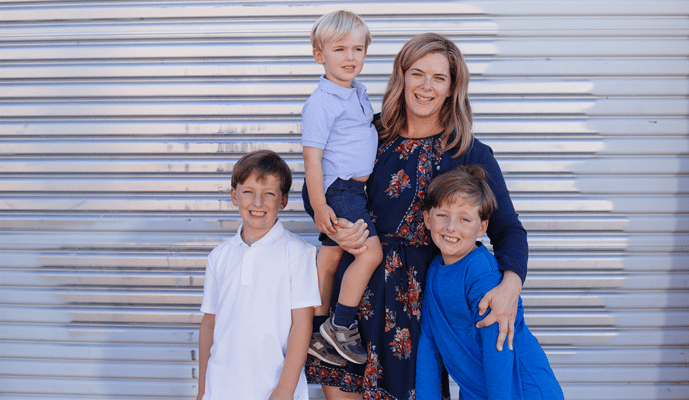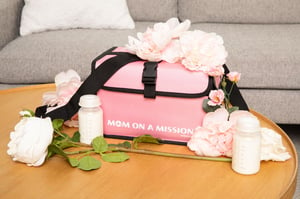How to Find & Manage Child Care in a Pandemic
By Milk Stork Team on July 6, 2020

Finding affordable, quality child care has always been hard – it’s exponentially more difficult during a pandemic. We caught up with Lynn Perkins, the CEO and co-founder of UrbanSitter to get her insights, best practices and tips for navigating this challenging new child care landscape.
Today, working families are faced with limited daycare options, additional costs and a dizzying array of micro-schools and learning pods that have sprouted up overnight. With more than a million users in 50 cities, UrbanSitter helps parents find, book and pay for trusted childcare — whether it’s last minute babysitting or full-time care — so that parents can place their focus back on work … or maybe even carve out a little bit of time for some self-care (think: “OpenTable for childcare).
Lynn, tell us about UrbanSitter. How did it start?
I had an “ah-ha moment” when a friend called in panic because her sitter cancelled at the last minute before an important event. As a natural “matchmaker,” I helped her find someone to step in, and during that process, I realized that there should be an easier, more efficient way to find a great babysitter. It was at that moment that I decided I’d be willing to leave my corporate job and start a business that would make booking a trusted sitter as easy as booking dinner reservations. Shortly after our founding in 2011, UrbanSitter launched a corporate benefit program to help HR teams provide UrbanSitter as a child care benefit to their employees.
The pandemic has caused a child care crisis and many parents are relying on learning pods and play pods to manage distance learning and childcare while working from home.
What tips do you have for parents as they assemble their pods?
There are two basic approaches to deciding which families to team up with for a pod:
- Geographic. Find like-minded family/families that have children roughly the same age who live nearby. This is particularly good for younger kids.
- Based on school groupings. Many schools are already assigning kids into smaller cohorts for if/when school returns and for ‘small group’ work within video ‘breakout’ rooms. Podding up with other kids from this cohort will make it easier to be fluid between in-person and virtual learning, if school goes back in-person part time and the pod meets on the other days.
It is crucial that all families are aligned on expectations for conduct within their pod, as well as outside of the pod. Many families choose to formalize their pod member rules into a written “pod agreement” that outlines the group’s expectations for health, safety, education, logistics, and finances—for example whether or not daily temperature checks should be required, disclosure of the people they have been around, and what they will do if someone in the pod contracts COVID-19.
Trust and safety have always been huge concerns when it comes to childcare, and now parents also need to also worry about health risks associated with COVID-19. What are some best practices that parents should be putting in place to help children, sitters, pod teachers, nannies and other caregivers stay healthy? (And, how can UrbanSitter help with this?)
UrbanSitter has partnered with CollectiveHealth to provide an option for families and sitters to use an app to monitor their COVID-19 test results and check daily symptoms. All parties should agree to follow CDC hygiene guidelines both during child care hours and outside of it. Families participating in a pod should outline their COVID-19 safety expectations in a pod agreement. Some families are opting for a dedicated sitter who works exclusively for their family to reduce their exposure. If you are in the process of hiring a new care provider in addition to the suggestions already mentioned you may want to include COVID-specific questions in your interview process. These may include questions such as:
- Are you and all members of your household, including roommates, following CDC guidance on social distancing?
- To minimize the potential for exposure to COVID-19, would you be willing to work with just our family? If so, what minimum hours would you require?
- Are you currently, or have you recently, experienced symptoms that could be related to COVID-19?
- How will you be getting to/from the job?
As a parent who visits your website for the first time, what are some helpful tips to help me find my best match?
- Add your family’s schools and local groups. UrbanSitter leverages your social networks and local groups, like your child’s school and your neighborhood parents’ group to find care providers to whom you have a real-world connection through people you know and trust.
- Post a job. Posting a job is always the most efficient way to find a sitter or nanny. In the job post, be sure to describe your family’s needs and outline the responsibilities and expectations for the job. We also offer pre-written screening questions that you can click to add to your post. When sitters or nannies express interest in your job post it’s easy to view their profiles and read their responses to your questions. If a candidate is of interest to you, it’s easy to book interviews or message additional questions.
How much should we pay our sitter, nanny or teacher? Have rates changed due to COVID?
Rates really vary by location, number of children and job responsibilities. Each year we publish a report on average babysitting rates by city to inform parents and care providers about current rates.
While we haven’t seen a shift in rates for regular nanny and babysitting jobs during COVID, we have seen new rate data around pod sitters. Our data suggests that pod sitter rates range from $10-15 per child per hour. If your pod is academically focused, you may want a sitter with a teacher or tutor background and credentials, which will come with a higher pay rate. You can also expect to pay more per child if your children are very young or if there are fewer children in your pod.
What do you think will be the lasting impacts of COVID-19 for the childcare space? (Both the good and the bad).
I definitely think that COVID will have lasting effects on the child care space. One of the negative impacts of COVID, which really worries me, is the number of parents—primarily mothers—who are considering leaving their jobs because managing their workload and child care responsibilities is not feasible. We conducted a survey of working parents and not surprisingly 70% of them say it’s difficult working remotely with kids. One out of five respondents are more likely to quit their job now than pre-COVID.
On the positive side, I think that there is increased awareness about the challenges of working and managing child care. I hope that awareness will result in better state and federally funded programs focusing on daycare & early childhood education. Even when it’s safe to return to the workplace, I think we will see an increase in flexibility of work location and schedule among companies where this is feasible. I also think that companies will expand their efforts to offer more family-focused benefits.


